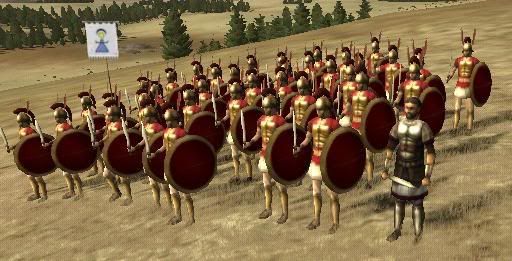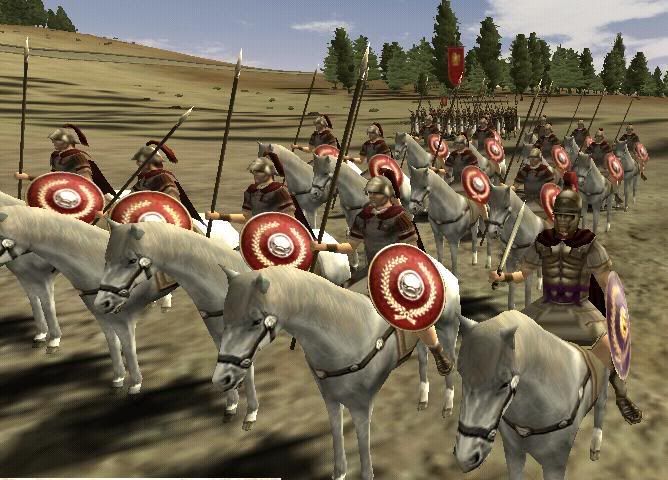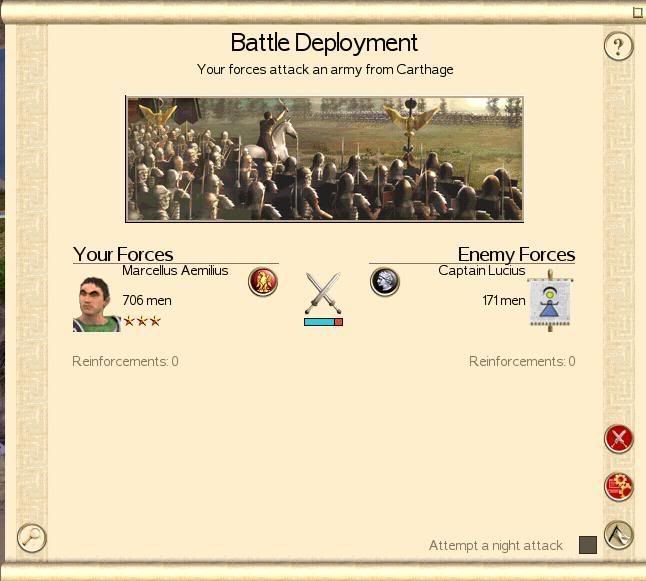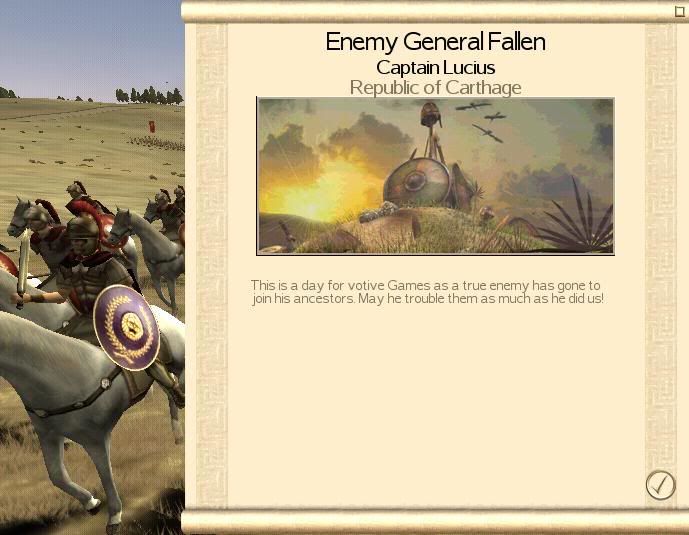North of Thapsus, 252 BC
This is the story of Lucius Dolabella:
Born in Messana in 285 BC. One of his earlier memories was when a Roman army, under the Consul Quintus, marched in and proclaimed the city liberated. It was a glorious day, for Carthaginian rule had been brutal and harsh. Lucius at that moment knew he wanted to be a soldier.
He couldn't be a principe, his personal preference, of course. He was far removed from the heartland of the Roman Republic. But when the large Auxilia building in Messana was constructed, he immediately signed up to be a swordsman. He would be part of the alae, those loyal Italians who would fight alongside their Roman friends in order to bring glory and freedom to all of those lands.
He served with honor and glory in the Alps, and later Afrika. Well enough to be considered one of the finest soldiers in his unit. He had killed his fair share of enemies, and gave his people much honor.
But then things happened. The other two units that had came from Sicily at the same time, skirmishers and spearmen, considered him their leader of sorts. They looked to him and followed his lead when it came to all sorts of matters.
The corruption of power combined with current sentiment made a nasty sum. The generals in the Carthaginian theatre were far from conforting. The new Consul, Servius Aemilius, was very young, and rumor had it that although a fine commander, the desert was claiming his soul. Servius' uncle, Marcellus, openly distrusted the Consul. Oppius was only a teenager, and Flavius Pacuvius, although he served admirably, was seeing his first action. Ever.
Despite all the fine victories won, Lucius had believed that there was no reason that the Romans should be in Afrika. He began to doubt everything, and wondered if Quintus was right to even invade Messana in the first place.
Finally, in one autumn day in 252 BC, a Carthaginian diplomat made his way to the fort where the alae were stationed. He offered Lucius and the three units there a sum of denarii to fight for them. After some discussion, Lucius accepted. He had thrown away his Roman values, once again serving the Republic of Carthage.
~~~~~~~
This is the story of Marcellus Aemilius:
Born 279 BC into a proud Roman family, the Aemilii. He grew up with Numerius Aureolus and others in Rome, but eventually Numerius departed for Greece. Marcellus, at the age of 16, stayed in the Scriptorium to further his education.
Finally, at 20, his military career began with the dispatch of some brigands threatening Rome. From there he went to the Alps, serving with the late Augustus Verginius, and killing the last Gallic King in Comata.
After that things dampened. He got into a falling-out with his nephew and the Consul, Servius. He didn't agree with anyone's plans for Rome, believing that the Republic was abandoning its principles. He was annoyed that Servius had delayed his voyage to Afrika. But he never once entertained the thought of deserting Rome.
Things perked up. Marcellus arrived in Afrika, survived a desperate sally battle, and repaired relations with him and Servius. He conquered some cities, and was gaining respect in the Senate. The Carthage Expedition was going well.
But then some alae decided to defect. While a problem since reinforcements were tough to come by, he knew an example would have to be set.
The battle itself was relatively short. After some initial skirmishing, the Gallic Swordsmen charged, followed up by his Praetoria. The symbolism - Romans ordering Gauls to kill Italians - was not lost on the defectors.
As the charge neared him, Lucius Dolabella suddenly realized how wrong he was. Realized that Carthage was failing, and that Rome was right. All he needed to see was Roman might in action again. But the problem was, the Roman might was directed at him.
Marcellus Aemilius, eyes blazing, cut his way through the crowd until he and his horse were facing Lucius. The leader of the defectors just stared, making no attempt to defend himself.
"You have learned your lesson, traitor," Marcellus growled. He then plunged his gladius into Lucius' neck, and slashed upwards. And Lucius Dolabella's complicated life had ended.
After that display, the remaining Italians laid down their weapons and surrendered. Marcellus ordered the Gallic Swordsmen to stop, who did so reluctantly.
Once back in Thapsus, the army made their way to the town square. Marcellus put the 21 surviving Italians on display and ordered the Gauls to slay them all. They did so.
Word of the deed quickly spread through the city and Afrika. The message was clear: Treason will be dealt with harshly.
Lucius Dolabella and the other Italian defectors could attest to that.















 Reply With Quote
Reply With Quote
Bookmarks